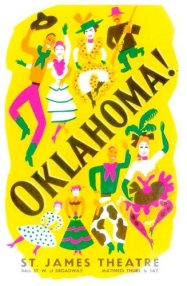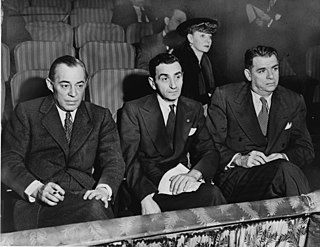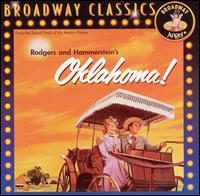Related Research Articles

Carousel is the second musical by the team of Richard Rodgers (music) and Oscar Hammerstein II. The 1945 work was adapted from Ferenc Molnár's 1909 play Liliom, transplanting its Budapest setting to the Maine coastline. The story revolves around carousel barker Billy Bigelow, whose romance with millworker Julie Jordan comes at the price of both their jobs. He participates in a robbery to provide for Julie and their unborn child; after it goes tragically wrong, he is given a chance to make things right. A secondary plot line deals with millworker Carrie Pipperidge and her romance with ambitious fisherman Enoch Snow. The show includes the well-known songs "If I Loved You", "June Is Bustin' Out All Over" and "You'll Never Walk Alone". Richard Rodgers later wrote that Carousel was his favorite of all his musicals.

Oscar Greeley Clendenning Hammerstein II was an American lyricist, librettist, theatrical producer, and director in the musical theater for almost 40 years. He won eight Tony Awards and two Academy Awards for Best Original Song. Many of his songs are standard repertoire for vocalists and jazz musicians. He co-wrote 850 songs.

Richard Charles Rodgers was an American composer, known largely for his work in musical theater. With 43 Broadway musicals and over 900 songs to his credit, Rodgers was one of the most significant American composers of the 20th century, and his compositions had a significant impact on popular music.

Lorenz Milton Hart was the lyricist half of the Broadway songwriting team Rodgers and Hart. Some of his more famous lyrics include "Blue Moon", "The Lady Is a Tramp", "Manhattan", "Bewitched, Bothered and Bewildered", and "My Funny Valentine".

The King and I is the fifth musical by the team of composer Richard Rodgers and dramatist Oscar Hammerstein II. It is based on Margaret Landon's novel, Anna and the King of Siam (1944), which is in turn derived from the memoirs of Anna Leonowens, governess to the children of King Mongkut of Siam in the early 1860s. The musical's plot relates the experiences of Anna, a British schoolteacher hired as part of the King's drive to modernize his country. The relationship between the King and Anna is marked by conflict through much of the piece, as well as by a love to which neither can admit. The musical premiered on March 29, 1951, at Broadway's St. James Theatre. It ran for nearly three years, making it the fourth longest-running Broadway musical in history at the time, and has had many tours and revivals.

Oklahoma! is the first musical written by the duo of Rodgers and Hammerstein. The musical is based on Lynn Riggs' 1931 play, Green Grow the Lilacs. Set in farm country outside the town of Claremore, Indian Territory, in 1906, it tells the story of farm girl Laurey Williams and her courtship by two rival suitors, cowboy Curly McLain and the sinister and frightening farmhand Jud Fry. A secondary romance concerns cowboy Will Parker and his flirtatious fiancée, Ado Annie.

South Pacific is a musical composed by Richard Rodgers, with lyrics by Oscar Hammerstein II and book by Hammerstein and Joshua Logan. The work premiered in 1949 on Broadway and was an immediate hit, running for 1,925 performances. The plot is based on James A. Michener's Pulitzer Prize–winning 1947 book Tales of the South Pacific and combines elements of several of those stories. Rodgers and Hammerstein believed they could write a musical based on Michener's work that would be financially successful and, at the same time, send a strong progressive message on racism.

Shirley Mae Jones is an American actress and singer. In her six decades in show business, she has starred as wholesome characters in a number of musical films, such as Oklahoma! (1955), Carousel (1956), and The Music Man (1962). She won the Academy Award for Best Supporting Actress for playing a vengeful prostitute in Elmer Gantry (1960). She played the lead role of Shirley Partridge, the widowed mother of five children, in the musical situation-comedy television series The Partridge Family (1970–1974), which co-starred her real-life stepson, David Cassidy, son of Jack Cassidy.

Rodgers and Hammerstein refers to the duo of composer Richard Rodgers (1902–1979) and lyricist-dramatist Oscar Hammerstein II (1895–1960), who together were an influential, innovative and successful American musical theatre writing team. They created a string of popular Broadway musicals in the 1940s and 1950s, initiating what is considered the "golden age" of musical theatre. Five of their Broadway shows, Oklahoma!, Carousel, South Pacific, The King and I and The Sound of Music, were outstanding successes, as was the television broadcast of Cinderella (1957). Of the other four shows that the team produced on Broadway during their lifetimes, Flower Drum Song was well-received, and none was an outright flop. Most of their shows have received frequent revivals around the world, both professional and amateur. Among the many accolades their shows garnered were thirty-four Tony Awards, fifteen Academy Awards, two Pulitzer Prizes and two Grammy Awards.

Flower Drum Song was the eighth musical by the team of Rodgers and Hammerstein. It is based on the 1957 novel, The Flower Drum Song, by Chinese-American author C. Y. Lee. It premiered on Broadway in 1958 and was then performed in the West End and on tour. It was adapted for a 1961 musical film.

Rodgers and Hammerstein's Cinderella is a musical written for television, but later played on stage, with music by Richard Rodgers and a book and lyrics by Oscar Hammerstein II. It is based upon the fairy tale Cinderella, particularly the French version Cendrillon, ou la Petite Pantoufle de Verre, by Charles Perrault. The story concerns a young woman forced into a life of servitude by her cruel stepmother and self-centered stepsisters, who dreams of a better life. With the help of her Fairy Godmother, Cinderella is transformed into a Princess and finds her Prince.

The King and I is a 1956 American musical film made by 20th Century-Fox, directed by Walter Lang and produced by Charles Brackett and Darryl F. Zanuck. The screenplay by Ernest Lehman is based on the 1951 Richard Rodgers and Oscar Hammerstein II musical The King and I, based in turn on the 1944 novel Anna and the King of Siam by Margaret Landon. That novel in turn was based on memoirs written by Anna Leonowens, who became school teacher to the children of King Mongkut of Siam in the early 1860s. Leonowens' stories were autobiographical, although various elements of them have been called into question. The film stars Deborah Kerr and Yul Brynner.

Oklahoma! is a 1999 British film adaptation of Rogers and Hammertstein's 1943 musical Oklahoma!, which in turn was based on the 1930 play Green Grow the Lilacs written by Lynn Riggs. The film was directed by Trevor Nunn and choreographed by Susan Stroman. The production featured the entire 1998 West End Revival cast at the Royal National Theatre led by Hugh Jackman as Curly McLain, Josefina Gabrielle as Laurey Williams, and Maureen Lipman as Aunt Eller.
"The Lonely Goatherd" is a popular show tune from the 1959 Rodgers and Hammerstein musical The Sound of Music that makes use of yodeling.

Oklahoma! is a 1955 American musical film based on the 1943 musical of the same name by Richard Rodgers and Oscar Hammerstein II, which in turn was based off the 1931 play Green Grow The Lilacs written by Lynn Riggs. It stars Gordon MacRae, Shirley Jones, Rod Steiger, Charlotte Greenwood, Gloria Grahame, Gene Nelson, James Whitmore, and Eddie Albert. The production was the only musical directed by Fred Zinnemann. Oklahoma! was the first feature film photographed in the Todd-AO 70 mm widescreen process.

Oklahoma! is the original soundtrack album of the 1955 film Oklahoma!, an adaptation of the musical Broadway play of the same name. The soundtrack charted No. 1 on the Billboard Pop Album Chart in 1956 and has been in continual print. On July 8, 1958, it became the first album to be certified "gold" by the RIAA, and was later certified "2x multi-platinum" on April 1, 1992.

Green Grow the Lilacs is a 1930 play by Lynn Riggs named for the popular folk song of the same name. It was performed 64 times on Broadway, opening at the Guild Theatre on January 26, 1931, and closing March 21, 1931. It had had an out-of-town tryout, running January 19–24, 1931, at the National Theatre in Washington, D.C.. It is the basis of the 1943 musical Oklahoma!, which had a 1955 film adaptation.
"My Favorite Things" is a show tune from the 1959 Rodgers and Hammerstein musical The Sound of Music.

I'm Thinking of Ending Things is a 2020 American psychological thriller film written and directed by Charlie Kaufman. The film is based on the 2016 novel of the same name by Iain Reid and stars Jesse Plemons, Jessie Buckley, Toni Collette and David Thewlis.

I'm Thinking of Ending Things is the 2016 debut novel of Canadian writer Iain Reid. It was first published in June 2016 in the United States by Simon & Schuster. The book has been described as a psychological thriller and horror fiction, and is about a young woman who has many doubts about her relationship with her boyfriend but nevertheless takes a road trip with him to meet his parents.
References
- ↑ Pogrebin, Robin (May 16, 2002). "Pore Jud Is . . . Sympathetic? Adding Depth To a Villain". The New York Times . Retrieved July 3, 2020.
- ↑ Carter, Tim (2008). Oklahoma!: The Making of an American Musical. Yale University Press p. 161. ISBN 978-0-3001-3487-2.
- ↑ Brian P. Rubin (September 4, 2020). "The ending of I'm Thinking of Ending Things explained". Looper . Archived from the original on September 4, 2020.
| This show tune-related article is a stub. You can help Wikipedia by expanding it. |